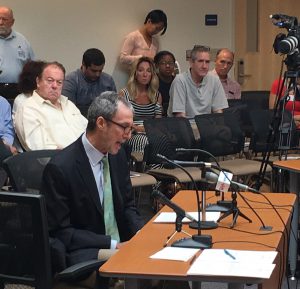New Jersey Future Blog
Joint Environment Committee Dives in on Climate Change, Coastal Resilience
August 14th, 2017 by New Jersey Future staff
The following article was written by New Jersey Future intern Chris Gough.
The Senate Environment and Energy Committee and the Assembly Environment and Solid Waste Committee met jointly Thursday morning to discuss climate change and its impact on New Jersey’s coastal communities. The two-and-a-half hour session included testimony from expert witnesses and the general public. Committee Co-chairs Sen. Bob Smith and Asm. Tim Eustace led the hearing, which took place in the coastal community of Lavallette.
The expert witnesses delivered their testimonies with a palpable sense of urgency, to legislators who appeared genuinely committed to addressing the problems associated with New Jersey’s changing climate. Among the experts who testified was New Jersey Future Planning Manager David Kutner. (Testimony)
Other witnesses included:
- Professor Anthony Broccoli (Rutgers University) (Testimony)
- Professor Edward Lloyd (Columbia University; the Fund for New Jersey)
- Jeanne Herb, Dr. Marjorie Kaplan (Rutgers University; NJ Climate Adaptation Alliance)
“Actions need to be taken now while we have time to plan ahead, instead of waiting and reacting to conditions that will leave us with no alternatives,” said Kutner, in prefacing a list of recommendations.
The meeting renewed the ongoing conversation about coastal resilience that began in the aftermath of Hurricane Sandy. The 2012 storm, which caused extensive flooding and billions of dollars in damage, served as a wake-up call to New Jersey residents and lawmakers regarding the state’s ability to withstand future major storm and rainfall events. The frequency and severity of such weather events is expected to increase over the next century as a result of human-influenced climate change.
Local and national conversations regarding climate change are typically centered on efforts to mitigate its impacts. Climate change expert Professor Anthony Broccoli stressed the importance of a two-pronged approach to climate change that includes both mitigation and adaptation—highlighting the fact that some changes to our climate have already taken place.
One point highlighted in the testimony was that the largest contributor to greenhouse-gas emissions in New Jersey is the transportation sector. The committee and witnesses discussed offshore wind energy, public transportation, and electric-vehicle-friendly infrastructure as areas where increased investment could help mitigate future impacts of climate change by reducing greenhouse gas emissions.
In terms of adaptation, the group deliberated a variety of possible alternatives to beach nourishment as a means of responding to sea-level rise and reducing the impacts of increased coastal flooding. Beach nourishment is considered by some to be a costly, temporary, reactionary, and inadequate solution to beach erosion.
Collectively, the experts emphasized the importance of taking a proactive, rather than reactive, approach to handling major rainfall events. Professor Edward Lloyd, borrowing a piece of wisdom from American patriot Benjamin Franklin, said, “the failure to plan is the plan for failure.” Sen. Bob Smith and several public witnesses echoed this sentiment by acknowledging that many state, county, and municipal plans urgently need updating in order to incorporate planning for the effects of climate change.
In looking forward, many committee members cited the upcoming gubernatorial election as an opportunity to bring attention to the issues of climate change and coastal resilience and engrave them into the agenda of the next administration.
Related: News Coverage of Hearing
- 08/11/2017: State needs to step up attempts to curb greenhouse-gas emissions (NJ Spotlight)
- 08/11/2017: Climate change: Five signs it’s already begun in New Jersey (Asbury Park Press)
- 08/10/2017: NJ lawmakers hold hearing on climate change (WBGO.org)

















